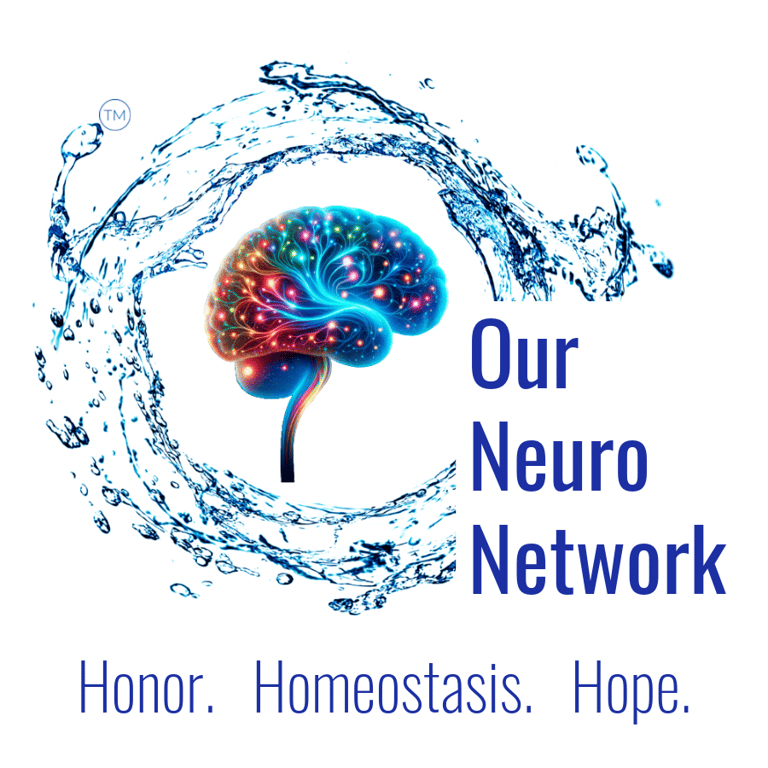HONOR. HOMEOSTASIS. HOPE.
Honoring Awareness and Advancing Care on Bardet-Biedl Syndrome Global Day
10/5/20253 min read


Recognizing BBS Global Day
October 4th is Bardet-Biedl Syndrome (BBS) Global Day, a day when patients, families, clinicians, and researchers come together worldwide to raise awareness, foster community, and accelerate research. For those affected, BBS is not only a rare genetic diagnosis, it is a lifelong condition with complex impacts on energy, metabolism, vascular health, and neurological function.
What Is Bardet-Biedl Syndrome?
BBS is a rare ciliopathy, a disorder caused by defective cilia, the hair-like projections on cells that function as energy hubs for the autonomic nervous system. When these structures malfunction, signaling pathways are disrupted across multiple organ systems.
Hallmark features include:
Retinitis pigmentosa (RP) causing blindness, sometimes accompanied by Usher syndrome causing hearing loss and balance disturbance
Obesity and metabolic dysfunction
Polydactyly (extra digits)
Kidney disease
Learning or cognitive challenges
Secondary Complications and Overlooked Symptoms
Patients with BBS may also face additional neurovascular and metabolic challenges like:
Intracranial hypertension (IH)
Venous congestion and impaired cerebral venous outflow
Headaches, migraines, and facial pain
Cognitive dysfunction and fatigue
Glucose instability and hypoglycemia due to inefficient carbohydrate handling
These complications highlight why multidisciplinary care is essential.
MC4R Pathway Disruption: A Shared Mechanism
BBS overlaps mechanistically with MC4R deficiency, as both involve disrupted melanocortin 4-pathway signaling. Key peptides impacted include:
Alpha-MSH
Neuropeptide Y
Agouti-related peptide (AGRP)
Insulin and glucose pathways
When these signals falter, energy balance and glucose regulation are destabilized.
Therapeutic Developments: Setmelanotide
One of the most hopeful recent developments is setmelanotide, an alpha-MSH agonist approved for BBS-related obesity (Clément et al., 2020). For patients with partial MC4R pathway function, it can restore signaling, reduce hunger, and improve weight regulation.
However, not all BBS variants respond. For example, my own autosomal dominant P299H MC4R deficiency pathogenic mutation leads to complete loss of MC4R function at both the cell surface and intracellularly, making setmelanotide ineffective in my case. This underscores the importance of genotype-specific treatment approaches when it comes to BBS, MC4R deficiency, and other MC4R pathway disturbances.
The Ketogenic Diet: Promise and Risks
The ketogenic diet offers another possible avenue by providing a more stable energy source, beta-hydroxybutyrate (BHB) bypassing unstable glucose metabolism. Some patients report improvements in energy, glucose homeostasis, mood, and cognition.
The ketogenic diet is not universally safe and suitable for all individuals. Risks include metabolic acidosis, fluid and electrolyte disturbance, kidney stones, kidney injury, liver injury, cholelithiasis (gall stones), hyperlipidemia, and nutritional imbalances. A medically necessary ketogenic diet should only be considered under medical supervision, preferably with support from a dietician or nutritionist.
The Importance of Screening
For BBS patients and carriers, proactive monitoring for the following are essential:
Vision and hearing loss
Intracranial pressure-related disorders like intracranial hypertension and hypotension, cerebrospinal fluid (CSF) leaks, and venous congestion with venous stenoses
Headache, migraine, and facial pain
Secondary cognitive decline from reversible or treatable conditions, such as nutritional deficiency or intracranial pressure-related disorders
Metabolic screening for obesity, insulin resistance, hypoglycemia, and other endocrine disturbances affecting the hypothalamic-pituitary-thyroid-gonadal axis.
My Personal Connection
In addition to living with autosomal dominant MC4R deficiency due to the P299H variant, I am also a carrier of an MC1R mutation associated with oculocutaneous albinism, as well as an MC2R mutation associated with familial glucocorticoid deficiency. Prior to my formal diagnosis with MC4R deficiency, I was concerned I had porphyria due to overlapping symptoms. Typically, carrier states do not yield disease in isolation, but when multiple mutations affect the melanocortin pathway, complex clinical pictures can be seen.
Though setmelanotide is not effective in treatment of my MC4R deficiency, all hope is not lost. I have experienced marked improvement in energy, glucose homeostasis, intracranial pressure-related disorders, headache, migraine, facial pain, and cutaneous eruptions or rashes with a medically necessary and supervised ketogenic diet. This, again, highlights the importance of an individualized or genotype-specific approach to treatment.
This lived experience deepens my professional commitment to advancing care, education, and research through Our Neuro Network.
Resources for Patients and Families
On BBS Global Day, I encourage families and clinicians to connect with supportive organizations:
Bardet-Biedl Syndrome Foundation (US): www.bardetbiedl.org
BBS UK: www.bbsuk.org.uk
National Organization for Rare Disorders (NORD): rarediseases.org
National Eye Institute – Retinitis Pigmentosa: nei.nih.gov
Closing Thoughts
BBS Global Day (October 4th) is a reminder that rare disease advocacy is rooted in both science and community. Advances like setmelanotide, nutritional therapies, and genetic research provide genuine hope, and highlight the importance of tailoring care to individual genetic profiles.
At Our Neuro Network, we remain committed to building bridges between research and lived experience, always guided by honor, homeostasis, and hope.
References
Clément, K., van den Akker, E., Argente, J., Bahm, A., Chung, W. K., Connors, H., De Waele, K., Farooqi, I. S., Gonneau, S., Gordon, G., Hale, P. M., Lam, C., Li, Z., López-Giménez, J. F., Mignot, C., Piening, B. D., Ravussin, E., Rosenbaum, M., Salzano, G., ... Kühnen, P. (2020). Efficacy and safety of setmelanotide, an MC4R agonist, in individuals with Bardet-Biedl syndrome and Alström syndrome: Multicentre, randomised, double-blind, placebo-controlled, phase 3 trial. The Lancet Diabetes & Endocrinology, 8(12), 960–970. https://doi.org/10.1016/S2213-8587(20)30364-8
Forsythe, E., & Beales, P. L. (2013). Bardet-Biedl syndrome. European Journal of Human Genetics, 21(1), 8–13. https://doi.org/10.1038/ejhg.2012.115
Mockel, A., Perdomo, Y., Stutzmann, F., Letsch, J., Marion, V., Dollfus, H., & Dollfus, H. (2011). Retinal dystrophy in Bardet-Biedl syndrome and related syndromic ciliopathies. Progress in Retinal and Eye Research, 30(4), 258–274. https://doi.org/10.1016/j.preteyeres.2011.03.001
"We walk with you."
~Our Neuro Network
Contact
Subscribe to newsletter
E-mail: connect@ourneuronetwork.org
Telehealth Phone: 808-295-4021
Telehealth Fax: 808-666-9212
Coaching and Consulting Phone: 307-335-4968
Coaching and Consulting Fax: 307-312-3277
Medical and Legal Disclaimer: The information provided on this website is for educational and informational purposes only. It is not a substitute for professional medical advice, diagnosis, or treatment. Do not disregard or delay seeking medical care because of content you have read here.
Always consult your licensed healthcare provider or qualified medical team before making any healthcare decisions, starting or stopping medications, or implementing any lifestyle, nutritional, or therapeutic interventions.
Use of this site and its content is at your own discretion and risk. No patient-provider relationship is established by viewing or interacting with this website or its associated social media, podcasts, or communications. If you are experiencing a medical emergency, call 911 or go to your nearest emergency department.
While every effort is made to ensure accuracy and currency, Our Neuro Network and its affiliates make no representations or warranties of any kind, express or implied, regarding completeness, accuracy, reliability, suitability, or availability of any information, products, or services mentioned herein.
By using this website, you agree that Our Neuro Network, its owner(s), affiliates, and representatives are not liable for any direct or indirect damages or consequences arising from your use of this content.
© 2025 Our Neuro Network | All Rights Reserved | Privacy Policy | Terms of Use
HONOR. HOMEOSTASIS. HOPE.
